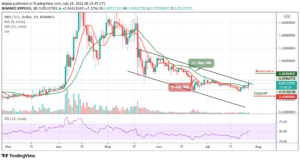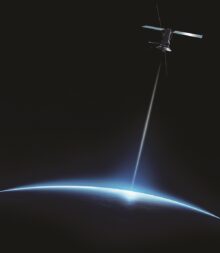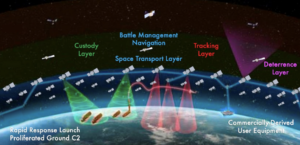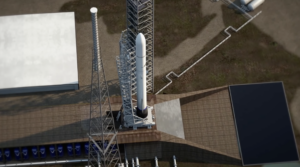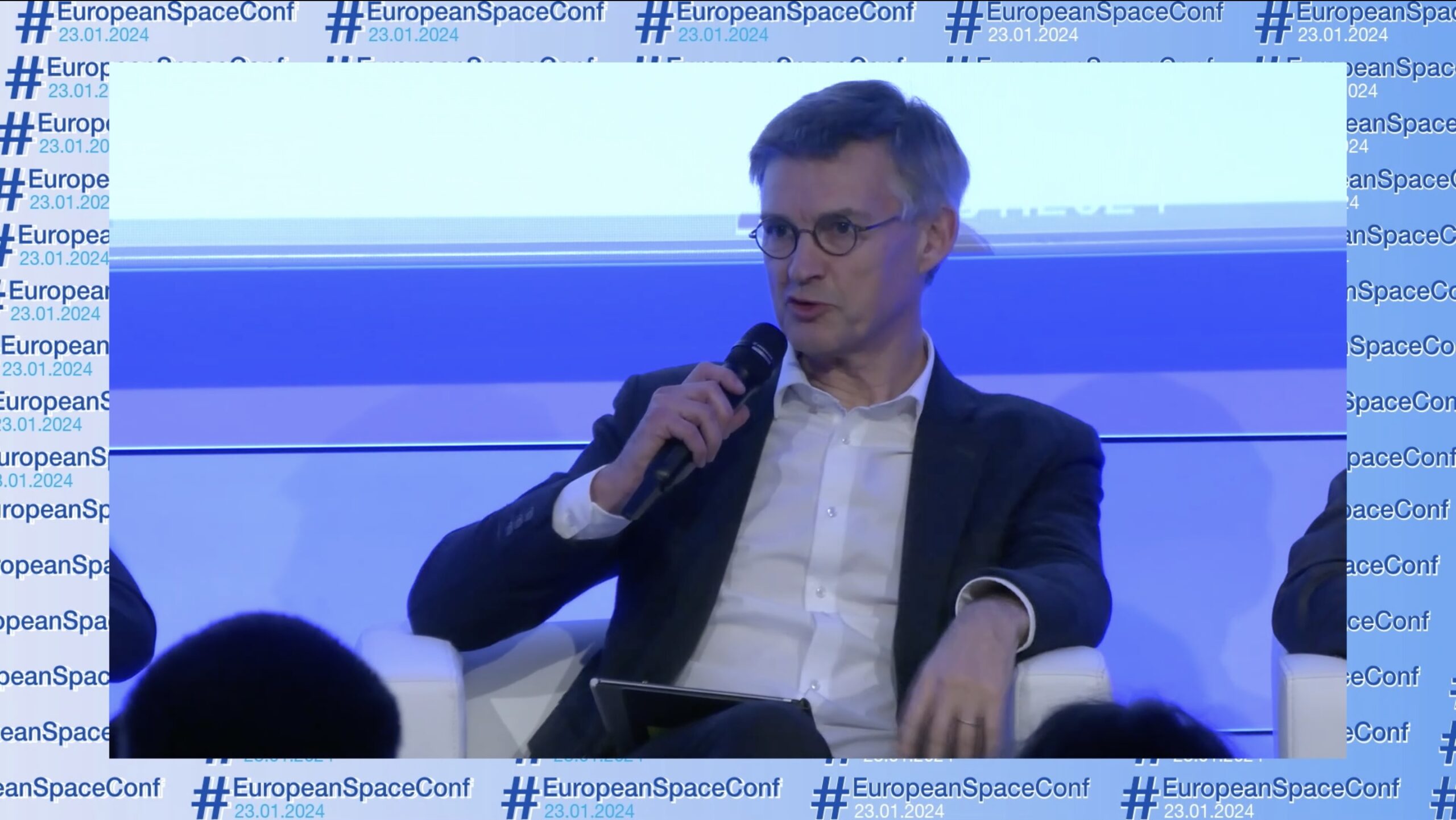
TAMPA, Fla. — European space giants are putting the final touches on a proposal for a sovereign broadband constellation they say is inspired by Starlink but will not be a copy of SpaceX’s network from across the Atlantic.
Executives from Airbus Defence and Space, Thales Alenia Space, and Arianespace — part of a group of companies developing the Infrastructure for Resilience, Interconnectivity and Security by Satellite (IRIS²) constellation, discussed the project Jan. 23 at the European Space Conference in Brussels.
Despite a looming mid-February deadline to submit their best and final offer to the European Commission, they were guarded about their proposal, including how the private sector would fund 60% of the 6 billion euro project ($6.5 billion) not covered by European Union members, not including potential cost overruns.
Francois Gaullier, senior vice president for constellations at manufacturer Airbus Defence and Space, said the objective for IRIS² is “to bring the same kind of services and capacity … as Starlink is doing today, but in a sovereign way.”
He said IRIS² would also be compatible with the 5G standards terrestrial telcos use, meaning the satellites could integrate with other communications systems, unlike Starlink, which operates within a closed network.
Sovereignty is a key element of the incoming proposal, added Marc-Henri Serre, senior vice president of telecommunications at manufacturer Thales Alenia Space. European governments could section off capacity from commercial users to prepare for spikes in demand.
Europe wants the ability to completely take over all the constellation’s capacity “in case of great crisis,” Catherine Kavvada, the European Commission’s director for secure and connected space, said on the panel.
Kavvada said Europe is also looking for a multi-orbit capability that pools in connectivity from geostationary and medium Earth orbit, tapping into existing investments and satellites already in operation. Starlink only operates from low Earth orbit (LEO).
Ultimately, she said the 27 countries that make up the European Union will give the final say on what would be the largest space contract in EU history, based on their individual needs.
Startup focus
Another element of IRIS² development that continues to attract questions is the mandate for at least 30% of contracts above 10 million euros to be subcontracted to smaller businesses, to foster a healthier space economy across the region.
Europe does not want to open up the consortium to smaller players as a charity, Kavvada said, but instead to encourage a more competitive process.
“What we said to the consortium is, please go ahead with the right competition approach, but don’t exclude somebody just because it’s a [small to medium-sized enterprise] or a startup.”
While the panelists shied away from discussing how their upcoming IRIS² proposal would meet this 30% threshold, Gaullier said ensuring the constellation meets stricter space sustainability rules Europe has in the works offers one route.
“The technical solutions to bring sustainability in orbit is not going to be [led by] Airbus,” he said, “and we’re going to do it with also some partners, some startups, and SMEs to do that.”
Serre noted that Thales Alenia Space already outsources work to smaller companies in areas such as geostationary satellite production.
“We are not even in our current business in a position where we want to do everything,” he said, “we don’t have a totally verticalized model.”
The launch question
IRIS² is slated to provide global coverage by 2027 and may include the launch of up to 170 LEO satellites, according to the European Union Agency for the Space Programme, with deployments set to start next year.
Despite setbacks with Arianespace’s next-generation Ariane 6 rocket, recently causing Europe to lose independent access to space and lean on U.S.-based SpaceX, Kavvada said the plan is still to deploy IRIS² with domestic rockets.
Steven Rutgers, Arianespace’s chief commercial officer, said Ariane 6 is preparing for a maiden flight around June and July.
“And then of course we have the question of ramp up,” Rutgers said. “It’s not a given. It’s ambitious, but this is what we do. Space is ambitious.”
European micro-launchers under development should also be ready to support Arianespace by the time launches need to commence, Kavvada added.
Thierry Breton, the European Union commissioner in charge of space policy, recognized the region is “facing an unprecedented acute crisis” in launch earlier in the conference.
Launch issues put the sovereign deployment of IRIS² at risk, he said, along with other flagship European constellations.
In his keynote speech, Breton said the Russia-Ukraine war is demonstrating the need for a constellation designed around defense from the outset.
“It will ensure secured communication for our armies, it will support space surveillance from space, it will be able to embark military payloads benefiting from the LEO satellites,” he said.
According to Breton, Europe is preparing to sign off on the IRIS² contract by the end of March.
- SEO Powered Content & PR Distribution. Get Amplified Today.
- PlatoData.Network Vertical Generative Ai. Empower Yourself. Access Here.
- PlatoAiStream. Web3 Intelligence. Knowledge Amplified. Access Here.
- PlatoESG. Carbon, CleanTech, Energy, Environment, Solar, Waste Management. Access Here.
- PlatoHealth. Biotech and Clinical Trials Intelligence. Access Here.
- Source: https://spacenews.com/europe-weeks-away-from-finalizing-sovereign-broadband-proposal/
- :has
- :is
- :not
- :where
- $10 million
- $UP
- 10
- 23
- 27
- 5G
- a
- ability
- Able
- About
- above
- access
- across
- acute
- added
- agency
- ahead
- Airbus
- All
- along
- already
- also
- ambitious
- an
- and
- approach
- ARE
- areas
- around
- AS
- At
- attract
- away
- based
- BE
- because
- benefiting
- BEST
- Billion
- bring
- broadband
- Brussels
- business
- businesses
- but
- by
- capability
- Capacity
- case
- Catherine
- causing
- charge
- Charity
- chief
- closed
- commercial
- commission
- commissioner
- Communication
- Communications
- communications systems
- Companies
- compatible
- competition
- competitive
- completely
- Conference
- connected
- Connectivity
- consortium
- continues
- contract
- contracts
- Cost
- could
- countries
- course
- coverage
- covered
- crisis
- Current
- deadline
- defence
- Defense
- Demand
- demonstrating
- deploy
- deployment
- deployments
- designed
- developing
- Development
- Director
- discussed
- discussing
- do
- does
- doing
- Domestic
- Dont
- Earlier
- earth
- economy
- element
- embark
- encourage
- end
- ensure
- ensuring
- Enterprise
- EU
- Euro
- Europa
- Europe
- European
- european commission
- european union
- Euros
- Even
- everything
- existing
- final
- fla
- flagship
- flight
- For
- Foster
- from
- fund
- giants
- Give
- given
- Global
- Go
- going
- Governments
- great
- Group
- Have
- he
- healthier
- history
- How
- HTTPS
- in
- include
- Including
- Incoming
- independent
- individual
- Infrastructure
- inspired
- instead
- integrate
- into
- Investments
- issues
- IT
- Jan
- jpg
- July
- june
- just
- Key
- Keynote
- Kind
- largest
- launch
- launches
- least
- Led
- LEO
- looking
- looming
- Low
- make
- mandate
- Manufacturer
- March
- May..
- meaning
- medium
- Meet
- Meets
- Members
- Military
- million
- model
- more
- Need
- needs
- network
- next
- next-generation
- noted
- objective
- of
- off
- offer
- Offers
- Officer
- on
- ONE
- only
- open
- operates
- operation
- or
- Orbit
- Other
- our
- over
- panel
- part
- partners
- plan
- plato
- Plato Data Intelligence
- PlatoData
- players
- please
- policy
- Pools
- position
- potential
- Prepare
- preparing
- president
- private
- private sector
- process
- Production
- project
- proposal
- provide
- put
- Putting
- question
- Questions
- Ramp
- ready
- recently
- recognized
- region
- resilience
- right
- Risk
- rocket
- Route
- rules
- Russia-Ukraine War
- s
- Said
- same
- satellite
- satellites
- say
- Section
- sector
- secure
- Secured
- security
- senior
- Services
- set
- Setbacks
- she
- should
- sign
- small
- smaller
- SMEs
- Solutions
- some
- sovereign
- Space
- SpaceX
- spikes
- standards
- starlink
- start
- startup
- Startups
- Still
- stricter
- submit
- such
- support
- surveillance
- Sustainability
- Systems
- Take
- tapping
- Technical
- telecommunications
- terrestrial
- that
- The
- their
- then
- they
- this
- threshold
- time
- to
- today
- TOTALLY
- touches
- under
- union
- unlike
- unprecedented
- upcoming
- use
- users
- vice
- Vice President
- want
- wants
- war
- Way..
- we
- Weeks
- were
- What
- which
- will
- with
- within
- Work
- works
- would
- year
- zephyrnet

